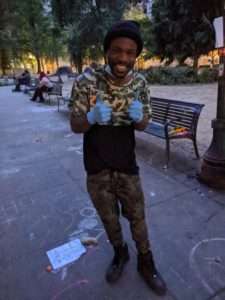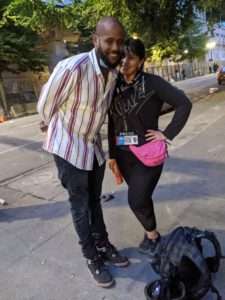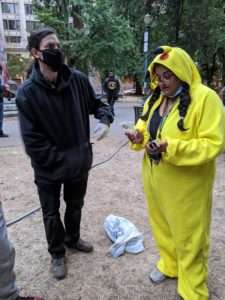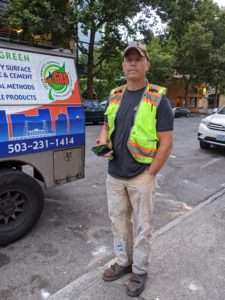Dispatch From Portland: The Morning Crew
A tarot card-reading liberal arts major, a Sudanese immigrant, and a former restaurant worker explain why they are out protesting in Rose City.
It's just after 5 a.m., and the scene at the Mark O. Hatfield United States Courthouse is as quiet as it will be today. A few young people linger on corners, a news crew watches two men kick through burnt trash behind the temporary fence in front of the courthouse, and a homeless man gathers empty cans into a plastic bag larger than he is.
Across the street in Lansdowne Park, people make ready for the day, cleaning barbecue grills and filling tubs with bottled water. Others crawl in and out of tents or sleep sprawled on benches, and when one young woman in pink footsie pajamas announces she's a unicorn looking for her tail, a guy nearby blazing a joint says, "Your tail looks good to me."
It's daybreak at the Portland protests, and a few of its denizens tell me what brings them here.
Stephan

Stephan: I've been coming two months, every night. I'm just a black man who feels like equality is a big problem in our society and I feel like we need to address that situation expeditiously and hit that right on the butt.
Violence throughout—from police through ourselves through public media—violence itself has to stop. I don't care who it comes from, what race, what creed, what demographic, we just have to stop being violent as a race. And there's only one race and that's the human race.
Nancy Rommelmann: How does what's happening here every night help achieve the goal of less violence?
Stephan: There's a lot of things that are not helping. The violence-upon-the-violence is not helping achieve the goal of stopping violence. People speaking out, chanting, marching, being peaceful; that's helping us achieve our goal, by showing that we can stand out and speak out and be together as a race, the human race that I spoke of. The fact that people are lighting fireworks, destroying things, I don't see that as helping or making a better-quality thing. I want people to understand that there are people out here that are willing to fight for them and to fight for your rights, I don't care if you're saying that Blue Lives Matter or that Black Lives Matter; I don't care what side you're on. I'm here to fight for you and to say that your vote matters that you have a right to feel however you want to feel and no one should judge you and you should not have to sacrifice your life for that.
Rommelmann: Has your thinking changed in the past two months?
Stephan: I've definitely evolved in how I've seen people respond to things, seen who actually is for the movement that we have for peace, and who's in the movement of "fuck the police." I've definitely seen there are people here on a different agenda. They should not be here screaming "Black Lives Matter"; they should scream their own agenda, if they want to be here. Like I said, I'm here for everybody, but you should be honest in whatever your opinions are.
Augustina

Augustina: I've been out here since May 30, almost every night. The Portland police injured my shoulder and my elbow and so I had to take a couple of nights off to get some medical attention. I don't have my sling on right now but I am normally in a sling. They kettled a group on June 30 outside of the Portland police union. They came in from five different sides after making the crowd march into an alley and just started tackling everybody from every which way. They tackled me while I was live-streaming, it's on my Instagram; you can see the police that tackled me, it's actually pretty scary.
I went to PSU [Portland State University]; I have a degree in liberal arts with an emphasis in social science and a dual degree in theatre. I also do the very Portland thing of reading tarot to predict political events and reading the energy.
Rommelmann: What did that tell you?
Augustina: I haven't done a reading since the marshals came. Do you want me to do one and send it to you?
Rommelmann: Sure.
Albedri
Albedri: I just got here today. I was actually sent here on business; I saw the riot and I just got out of my car. But at the same time, the reason I took the job was because I saw the wall of mothers on TV and I just had to come. It's just so beautiful. For them to stand in front and even though it's all about race to not to make it about race—there's about 14 black people here—the way they sacrificed their own well-being and the well-being of their future children, it was just something too beautiful for me to sit and watch it on TV.
I came from Sudan when I was two years old. We just had our own revolution recently. We had a dictator [Omar al-Bashir] from 1989; I was born in 1990. He was president for 31 years, and finally, we kicked him out last year and we got off the U.S. terrorist list.
Rommelmann: Do you see similarities with what's happening in Portland?
Albedri: I hope so. What I love about America, and specifically Portland, is every voice is heard here. In Sudan we also have racism, where it's tribalism; where it's this, that, and the third. The movement, even in my country, even the movement here in the United States, was led by a lot of the beautiful sisters; they got up there and they had a lot of knowledge. Their voice was heard. To me, that's a beautiful thing, that's true freedom.
It's not absolute freedom, but we're working towards that. I mean, we were treated like terrorists today, with the tear gas; I got hit in the face with rubber bullets. But we all did, and that's what's so beautiful about the United States, right?
Black people were the minority today. Ninety-four percent of the people standing out here today were just people who, something about their soul spoke to them; it said, if we're not all free, none of us are free.
Mike
Mike: I've been out here probably 40 nights out of the whole deal. My job was lost from Coronavirus. I was in the service industry, at a nice restaurant here in town, I'll just say it was in The Nines [Hotel] so that will narrow it down to two restaurants.
What made me come down here is, I'm 39 years old and I'm from Southern California and I grew up during the Rodney King beating and the LA riots in 1992. I was a huge fan of basketball and I remember the Lakers game being interrupted to show me, at nine years old, a black man being beat by four cops 52 times. I have a 14-year-old son and I don't want him to grow up with the same thing I grew up with, even though it's already happening. But I'm out here because I feel like I can make that end, maybe, before he has to.
Rommelmann: In what direction do you see the protests evolving and to what end?
Mike: I've talked to [Portland Mayor] Ted Wheeler, and today I reached out to [Portland mayoral candidate] Sarah [Iannarone] about what her plans were. I reached out to [mayoral candidate] Teressa [Raiford]; she's a black woman and she's very important in the community. I don't know anything about Sarah.
Rommelmann: She's pro-antifa.
Mike: Well, that's kind of a crazy thing to be, if you're going into politics. Like, I'm anti-fascist. I would never group myself with a thing called antifa—whatever that is. Not that I'm not interested in it, but I don't affiliate myself with any group. I can be anti-fascist on my own.
Let me put it this way. I'm not an anarchist; I don't come down here and set fires; I'm not throwing anything. But I'm against a fascist police state, which is what I've witnessed the last week or so.
Rommelmann: You feel the feds being here is equivalent to a fascist police state?
Mike: Absolutely, 100 percent. This has nothing to do with the city of Portland. They were never asked to be here. I was here the night when the snatch vans came out. There was no angry antifa mob or whatever the government is telling everybody on the news. There were 30 people out there, two minivans going around picking people up. That's fascism. I've never seen anything like it.
Megan

Megan: I started watching my friend's livestream [of the protests]. I got in my car, came down here, parked two blocks away, and [the feds] let off CS gas. This was back on June 7. I started driving around and making sure people were in pairs and giving them rides to the MAX [light rail]. Then I got arrested for chasing the police around as they chased the protesters around. That was June 8; that was my first arrest. And then I started coming out and meeting more people; building a family essentially. I know my [two-year-old] daughter is taken care of so I can take care of other people.
Rommelmann: Where is your daughter?
Megan: She is in Northeast Portland, with my parents.
Rommelmann: What are you doing here at the camp?
Megan: Anything that needs to be done.
Rommelmann: You said people were calling you Mama.
Megan: Yeah. I don't get to be with my daughter so I don't feel like a mom, so coming out here and everybody calling me Mama, it gives me a purpose, so that's why I'm out here. There are so many teenagers that are living in group homes and shelters that they feel their parents don't care about them, so they're fine being on the front lines being shot with pepper bullets, having flash grenades thrown at them and being shot with a fucking rubber bullet. I can't have it happen day after day after day, and them feeling that that's what they're supposed to do, there are so many that have said, "Nobody loves me, it's OK if I die." It shatters me.
Rommelmann: They're finding family.
Megan: Yeah. We were saying "gang gang," because that's a thing, but we've been saying "fam-family." That's what we tell the police; that's what we tell the feds.
Rommelmann: Are you camping out here?
Megan: I live in my car right now. When I can afford a place and it's safe for [my daughter and me] to live together, I'll get a place, yes.
Charlie
Charlie: I'm a Portland resident, I'm just here doing some volunteering. I've been here a few nights, but this is actually my first time here in the morning. Riot Ribs put out a call earlier this week, they need more people in the morning, so the people here at night can actually get some rest. I'm like, I can do that! I'm not the most confrontational person, so I'm more prepared to help out in this sort of way where I can just clean things up.
I got here at 5 a.m. We're first picking up a lot of trash, then making sure it's organized in the back, making sure everything's set up for the day. I'm only here until 9 a.m., then I have to go to my 9-to-5 job. I'm an education administration assistant.
Rommelmann: Is your employer cool with you being here?
Charlie: I think so. A lot of my coworkers are involved. I have a coworker who's an ACLU legal observer who's been out more often than I have. I believe in the cause. As a white person, trying to help out as much as possible, cede as much of my privilege, which is me giving my time and giving money, all those resources that I have an excess of. I just believe in Black Lives Matter and police abolition.
Rommelmann: Do you believe in complete police abolition?
Charlie: Yes.
Rommelmann: How instead are citizens to be protected?
Charlie: There's a lot of different answers for that, from people far smarter than I am at that. There's social work. I think that's one of the answers. Moving some of those responses where you think you'd need the police; you can actually use mental health workers or nurses in ways that are not a use of force.
Paul

Paul: I own Graffiti Removal Services. We're a little busy. Haven't had a day off since this all started.
Rommelmann: You look pretty fresh. You were not out here last night?
Paul: I was not out here last night, but I'm out here early this morning, to clean up the aftermath.
Rommelmann: There's a lot to clean up. I said good morning just now to some of the municipal garbagemen and they were like, "Lady, we have no time for you."
Paul: Yeah, they have no time. We'll have multiple trucks out here, scouring within an eight-block radius, cleaning up, helping business owners, property owners, some city property. The Bangkok Palace [restaurant] over here? They're open, but they still get graffiti every night. It's an added expense on top of all the COVID stuff going on. It's kind of a double whammy. A little perfect storm going on.
Rommelmann: Some workers told me, they're not cleaning the graffiti off the courthouse every day, that it doesn't make any sense with the protesters coming back every night.
Paul: At the federal building they're not doing it, but we do City Hall, we do the Justice Center, we do the cop [station], because if we don't get it off, it accumulates more and more. At this point, the feds will probably have to replace all that stone; they can't even clean it now, and with spray can and ink pen marker and Sharpie marker, the stone is a sponge, so the more it sits, the more is soaks in, the worse it gets. You just want to keep up on it as fast as you can.
Rommelmann: Do you see an end to this?
Paul: With the political climate and with summer and it being warm out, there's probably not an end until after the first of the year, unfortunately. When it starts to get cold and rainy, it may slow down a little bit. It's kind of, again, this is a perfect storm, everybody's kind of out here, and with social media calling for people to come down, not only in Portland but Seattle, Chicago. We would have thought this would have ended three weeks ago, but it just keeps going and going and going.
Rommelmann: It's good business for you, but…
Paul: It is; we're busy, but we have a division of the business that protects public artworks; we're actually putting our anti-graffiti coating on a Black Lives Matter murals, the murals up on the Apple Store; they're preserving them and giving them to a gallery, so we can be doing stuff within the community besides cleaning up all the anarchy stuff. We can be doing other things to help the community besides this.

Show Comments (216)